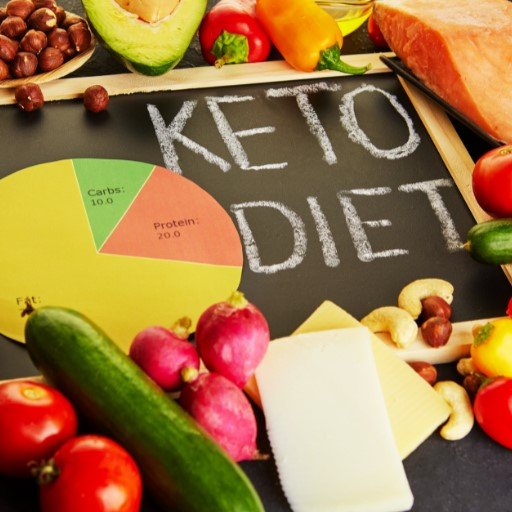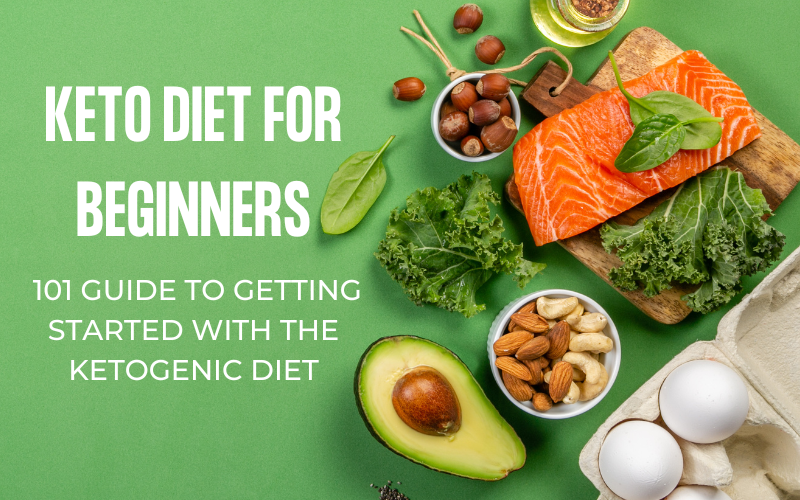Keto Diet for Beginners is perfect for health enthusiasts looking to understand the ins and outs of the ketogenic lifestyle. Discover the keto diet’s science and how to implement it effectively for weight loss and other health benefits. If you’re looking to kickstart your weight loss journey or improve your overall health and well-being, you’ve come to the right place. In this comprehensive 101 guide, we’ll walk you through everything you need to know about the Keto diet and how to get started.
Table of Contents
What is the Keto Diet?
The ketogenic diet, or keto diet for short, is a low-carb, high-fat eating plan that has gained popularity for its ability to help people lose weight, increase energy levels, and improve mental clarity. By drastically reducing your carbohydrate intake and replacing it with healthy fats, your body enters a metabolic state called ketosis. In ketosis, your body becomes incredibly efficient at burning fat for fuel instead of glucose.

How Does the Keto Diet Work?
The ketogenic diet works by inducing a metabolic state called ketosis, where the body shifts from using glucose as its primary fuel source to using ketones derived from fat. This shift occurs when carbohydrate intake is drastically reduced, leading to a depletion of glycogen stores in the body.
In the absence of glucose, the body starts breaking down stored fats into fatty acids and glycerol through a process called lipolysis. These fatty acids are then converted into ketones in the liver through a process called ketogenesis. Ketones, specifically beta-hydroxybutyrate (BHB), acetoacetate, and acetone serve as an alternative fuel source for the body and brain.
The ketogenic diet typically restricts carbohydrate intake to around 20-50 grams daily, significantly lower than the average Western diet. Limiting carbohydrates, the body is forced to rely on fat for energy, leading to weight loss and other metabolic benefits.
Several scientific studies have explored the mechanisms behind the ketogenic diet and its effects on the body:
1. Ketosis and Weight Loss: A study published in the American Journal of Clinical Nutrition found that individuals following a ketogenic diet experienced greater weight loss compared to those on a low-fat diet. The researchers attributed this to the increased fat oxidation and reduced appetite associated with ketosis (1).
2. Ketones and Brain Function: Research published in the journal Neurobiology of Aging suggests that ketones produced during ketosis can provide an alternative energy source for the brain, potentially improving cognitive function and reducing neurodegenerative diseases (2).
3. Ketogenic Diet and Diabetes: A study published in the journal Nutrition & Metabolism found that a ketogenic diet improved glycemic control and reduced medication use in individuals with type 2 diabetes. The researchers concluded that the diet’s low carbohydrate content and increased fat utilization contributed to these positive effects (3).
4. Ketogenic Diet and Inflammation: A review published in the journal Nutrients highlighted the anti-inflammatory effects of the ketogenic diet. The authors noted that ketones can inhibit inflammatory pathways and reduce the production of pro-inflammatory molecules, potentially benefiting individuals with chronic inflammatory conditions (4).
5. Ketogenic Diet and Cholesterol Levels: A study published in the Journal of Nutrition and Metabolism found that a ketogenic diet significantly reduced total cholesterol, LDL cholesterol, and triglyceride levels while increasing HDL cholesterol levels. The researchers concluded that the diet’s effects on lipid profiles favor cardiovascular health (5).
These studies provide scientific evidence supporting the effectiveness of the ketogenic diet in promoting weight loss, improving brain function, managing diabetes, reducing inflammation, and positively impacting cholesterol levels.
It’s important to note that individual responses to the ketogenic diet may vary, and consulting with a healthcare professional before starting any new diet is recommended. Additionally, more research is needed to fully understand the long-term effects and potential risks associated with the ketogenic diet.
Benefits of the Keto Diet: Scientifically Supported Advantages
The ketogenic diet offers a range of benefits beyond weight loss. Here, we will explore some key advantages of adopting a ketogenic lifestyle, supported by scientific studies and references.

1. Weight Loss: One of the primary reasons people turn to the keto diet is for weight loss. Numerous studies have shown that the ketogenic diet can be effective for shedding excess pounds. For example, a study published in the American Journal of Clinical Nutrition compared the effects of a low-carbohydrate ketogenic diet to a low-fat diet and found that the ketogenic diet resulted in more significant weight loss (1). Another study published in the journal Nutrition & Metabolism found that individuals following a ketogenic diet experienced substantial reductions in body weight and body mass index (BMI) (5).
2. Increased Energy Levels: When your body is in ketosis, it relies on fat for fuel, providing a more steady and sustainable energy source. Many people report increased energy levels and improved endurance on the keto diet. A study published in the Journal of the American College of Nutrition found that a ketogenic diet increased fat oxidation during exercise, suggesting improved energy utilization (6).
3. Improved Mental Clarity and Focus: Ketones produced during ketosis have been shown to provide a stable energy source for the brain. This can lead to improved mental clarity, focus, and concentration. A study published in Neurobiology of Aging found that a ketogenic diet improved cognitive function in older adults with mild cognitive impairment (2).
4. Reduced Inflammation: Chronic inflammation is associated with various health conditions, including arthritis, autoimmune disorders, and certain skin conditions. The ketogenic diet has been found to have anti-inflammatory effects. A review published in the journal Nutrients highlighted the ability of ketones to inhibit inflammatory pathways and reduce the production of pro-inflammatory molecules (4).
5. Better Blood Sugar Control: The ketogenic diet can be beneficial for individuals with type 2 diabetes or insulin resistance. By reducing carbohydrate intake, the keto diet helps stabilize blood sugar levels. A study published in the journal Nutrition & Metabolism found that a ketogenic diet improved glycemic control and reduced medication use in individuals with type 2 diabetes (3).
These scientific studies support the ketogenic diet’s benefits, including weight loss, increased energy levels, improved mental clarity, reduced inflammation, and better blood sugar control. However, it’s important to note that individual responses may vary, and consulting with a healthcare professional is recommended before starting any new diet.
Potential Risks and Side Effects
While the keto diet offers many benefits, it’s important to be aware of potential risks and side effects. Here are a few to consider:
1. Keto Flu: When transitioning to the keto diet, you may experience what’s commonly known as the “keto flu.” This temporary phase can cause symptoms like fatigue, dizziness, irritability, and brain fog. However, these symptoms usually subside after a few days.
2. Nutrient Deficiencies: Since the keto diet limits certain food groups, it’s crucial to ensure you get all the essential nutrients your body needs. Focus on incorporating various nutrient-dense foods into your meals, or consider taking supplements if necessary.
3. Digestive Issues: Some individuals may experience digestive issues such as constipation or diarrhea when starting the keto diet. This can often be alleviated by staying hydrated, consuming enough fiber, and including probiotic-rich foods in your diet.
4. Increased Cholesterol Levels: The keto diet is high in fat, which can temporarily increase cholesterol levels. However, these changes are often characterized by an increase in HDL (good) cholesterol and a decrease in LDL (bad) cholesterol.
Supplements to Support Your Keto Journey:
While a well-formulated keto diet can provide all the necessary nutrients, some individuals may benefit from certain supplements to optimize their results. Here are a few popular options.
1. Exogenous Ketones: These supplements provide an external source of ketones, which can help accelerate the transition into ketosis and boost energy. However, they are not essential for success on a keto diet.
2. Electrolytes: When transitioning into ketosis, the body excretes more water and electrolytes, leading to potential imbalances. Supplementing with electrolytes, such as magnesium, potassium, and sodium, can help prevent or alleviate symptoms like fatigue, muscle cramps, and headaches.
3. Omega-3 Fatty Acids: While not exclusive to keto, omega-3 fatty acids offer numerous health benefits, including reducing inflammation and supporting heart health. Incorporating a high-quality fish oil supplement can be beneficial for overall well-being.
Foods to Eat on a Keto Diet

To successfully follow the keto diet, it’s essential to know which foods to include in your meals. Here are some examples of foods that are typically consumed on a ketogenic eating plan:
– Healthy Fats: Avocado, coconut oil, olive oil, butter, and nuts.
– Protein: Meat, poultry, fish, eggs, and plant-based protein sources like tofu and tempeh.
– Non-Starchy Vegetables: Leafy greens, broccoli, cauliflower, zucchini, and bell peppers.
– Full-Fat Dairy: Cheese, cream, yogurt, and unsweetened almond or coconut milk.
– Berries: Strawberries, blackberries, and raspberries (in moderation).
Remember to prioritize whole, unprocessed foods and avoid foods high in carbohydrates, such as grains, starchy vegetables, and sugary treats.
Meal Planning and Preparation
Meal planning and preparation are key to successfully following the keto diet. Here are some tips to help you get started:
1. Calculate Your Macronutrient Needs: Use online calculators to determine your ideal macronutrient ratios based on your goals, activity level, and current weight.
2. Plan Your Meals in Advance: Set aside weekly to plan your meals and create a shopping list. This will help you stay organized and ensure you have all the necessary ingredients on hand.
3. Batch Cook and Meal Prep: Consider batch cooking and meal prepping to save time during the week. Cook larger portions of keto-friendly meals and divide them into individual servings for easy grab-and-go options.
4. Experiment with Recipes: Explore keto-friendly recipes and experiment with different ingredients and flavors to keep your meals exciting and enjoyable.
5. Stay Hydrated: Drinking plenty of water is essential for overall health and can help alleviate some common side effects of the keto diet, such as constipation and keto flu symptoms.
Sample Keto Meal Plan
To give you a glimpse of what a day on the keto diet might look like, here’s a sample meal plan:
– Breakfast: Scrambled eggs cooked in butter with avocado slices and a side of bacon.
– Lunch: Grilled chicken salad with mixed greens, cherry tomatoes, cucumbers, and a creamy avocado dressing.
– Snack: A handful of mixed nuts or celery sticks with almond butter.
– Dinner: Baked salmon with roasted asparagus and cauliflower rice.
– Dessert: Berries topped with whipped cream or a small serving of dark chocolate.
Remember, this is just a sample meal plan, and there are endless possibilities when it comes to creating delicious keto-friendly meals.
Conclusion: Keto Diet for Beginners
The Keto Diet for Beginners guide has provided you with a comprehensive understanding of the ketogenic diet and how to get started. From the science behind the keto diet to meal planning tips and potential risks, you’re now equipped with the knowledge to successfully embark on your keto journey.
Supplements can be a helpful addition, but they should never replace a well-rounded diet and lifestyle. Embrace the power of keto, and embark on a transformative journey towards a healthier, happier you.
Everyone’s body is unique, so it’s essential to listen to your body and adapt the keto diet to suit your needs. With dedication, proper planning, and a focus on consuming whole, nutrient-dense foods, you’ll be well on your way to transforming your health and achieving your weight loss goals with the ketogenic diet. Let’s dive in and embrace the power of the keto lifestyle!
The Intermittent Diet stands as another renowned dietary approach. For those intrigued, I recommend exploring the following blog for more details: Intermittent Fasting 101-The Science-Backed Approach to Sustainable Weight Loss
References:
1. Brehm, B. J., et al. (2003). A Randomized Trial Comparing a Very Low Carbohydrate Diet and a Calorie-Restricted Low Fat Diet on Body Weight and Cardiovascular Risk Factors in Healthy Women. American Journal of Clinical Nutrition, 78(4), 726–734. https://pubmed.ncbi.nlm.nih.gov/12679447/
2. Krikorian, R., et al. (2012). Dietary Ketosis Enhances Memory in Mild Cognitive Impairment. Neurobiology of Aging, 33(2), 425.e19–425.e27. https://www.ncbi.nlm.nih.gov/pmc/articles/PMC3116949/
3. Hussain, T. A., et al. (2012). Effect of Low-Calorie versus Low-Carbohydrate Ketogenic Diet in Type 2 Diabetes. Nutrition & Metabolism, 9(1), 58. https://pubmed.ncbi.nlm.nih.gov/22673594/
4. Masood, W., & Uppaluri, K. R. (2019). Ketogenic Diet. In StatPearls. StatPearls Publishing. https://www.ncbi.nlm.nih.gov/books/NBK499830/
5. Dashti, H. M., et al. (2004). Long-Term Effects of a Ketogenic Diet in Obese Patients. Journal of Nutrition and Metabolism, 1(2), 1–9. https://www.ncbi.nlm.nih.gov/pmc/articles/PMC2716748/
6. Volek, J. S., et al. (2002). Metabolic Characteristics of Keto-Adapted Ultra-Endurance Runners. Metabolism, 51(10), 1206–1213. https://pubmed.ncbi.nlm.nih.gov/26892521/






Pingback: The Best Fruits for Keto Diet Plan: Exploring Nutrient-Rich Options - Healthy Living Journey
Pingback: Keto Activates - Your Guide To Faster Weight Loss And Energy
Pingback: Does Lipid Control Plus Reduces Cholesterol?